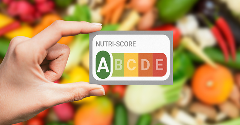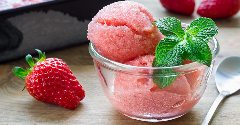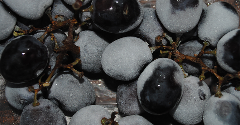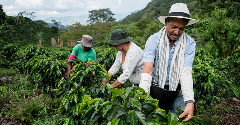News
Iced, RTD coffee launches on the rise
5 Jun 2018According to the latest research from Mintel Global New Products Database (GNPD), cold coffee has drinkers buzzing, as around one in five (19%) global new coffee launches was iced, ready-to-drink (RTD) in 2017, up from 16% in 2015.

According to the latest research from Mintel Global New Products Database (GNPD), cold coffee has drinkers buzzing, as around one in five (19%) global new coffee launches was iced, ready-to-drink (RTD) in 2017, up from 16% in 2015.
While Europe has been slower to follow the iced coffee boom, Mintel highlights strong potential among younger drinkers. Two-thirds (66%) of UK 18-24-year-old coffee drinkers think chilled coffee is a good alternative to sugary drinks, compared to a quarter (26%) of drinkers aged 45+. This echoes what is happening in America where younger drinkers, who are less ingrained in the ritual of drinking hot coffee, have driven RTD coffee growth. Some 68% of US 18-34-year-olds currently consume single-serve RTD coffee compared to 43% of all adults.Globally, Japan leads in RTD coffee innovation, accounting for 18% of all iced RTD coffee launches in 2017. The US follows, accounting for 13% of these launches in 2017, up from 10% in 2016.Chilled coffee is thriving in the US, growing at least 10% annually between 2013-17. In fact, more than half (56%) of new RTD coffee launches in the US were cold brew in 2017, up from 38% the year prior. Meanwhile, RTD coffee is also building momentum in China; Mintel forecasts annual growth of around 20% in the next five years as RTD steals more share from instant coffee.But despite the rapid rate of growth of RTD elsewhere in the world, Europeans remain resistant to the lure of iced coffee. While Spanish consumers are most likely to have tried iced/chilled coffee in Europe, only 10% have actually purchased it either from a store or online. Meanwhile, in 'coffee-purist' countries like France and Italy, purchase of iced/chilled coffee among all adults is just 3% and 4%, respectively.Jonny Forsyth, Associate Director, Mintel Food & Drink, said:“Global investment in chilled, RTD coffee has increased as producers target a younger drinker who enjoys the format's taste, refreshment and indulgence. RTD coffee is proving a better format for innovation than other hot-serve formats and, in 2017, manufacturers continued to push the format's boundaries. Cold brew is helping to premiumise the RTD category and is growing fast in the US, albeit less so in other markets. But while new product launches of iced coffee have reached record highs globally, in the US cold brew has emerged as a vibrant growth segment of chilled coffee, and could prove to be the tipping point for take-up of cold coffee in Europe. The key to success lies with the younger generation who have been introduced to chilled coffee in branded coffee shops, which are growing quickly in Europe.”After experiencing strong gains from 2012-15, the US coffee market slowed somewhat from 2016-17 as market penetration of single-cup coffee makers grew saturated. However, the US is still comfortably the world's biggest market by volume, and is premiumising in response to the influence of the nations dynamic coffee shops market. Last year, US consumers bought 607,000 tonnes of coffee, followed by Brazil (425,000 tonnes), Germany (424,000 tonnes), Japan (304,000 tonnes), and finally Indonesia (268,000 tonnes). Meanwhile, in the UK sales of coffee stood at 63,000 tonnes, while in China sales reached 53,000 tonnes.The US is also at the forefront of innovation, accounting for 11% of all global coffee launches in 2017. This is more than double the innovation of its nearest competitors Japan, France and the UK, each accounting for 5% of global coffee innovation.While the US leads the way in volume sales, North European countries enjoy a very high per capita consumption of coffee—especially in Finland, where consumers drank 7.91kg per person in 2017, and Norway, where they consumed 6.62kg.The rise of 'super coffee' reflects how third-wave coffee shops (and some retail brands) have increasingly pushed coffee with health benefits such as added coconut oil, chia seeds, protein and grass-fed butter.Mintel highlights opportunities for coffee brands to target health-obsessed younger drinkers seeking added health benefits. In the US, one in six (17%) 18-34-year-old male coffee drinkers view added functionality (eg extra protein, added vitamins) as important when choosing which coffee to drink.Finally, it seems coffee is following global consumers’ love affair with all things natural. In 2017, 10% of global coffee launches claimed to be organic, up from 8% in 2016. This rise was led by the US, where organic accounted for 22% of all coffee launches in 2017, up from 15% in 2016.“Coffee with added protein is still a relatively unexplored area of global coffee innovation despite Starbucks targeting this space in the US market since 2015. Increasing attention to health and wellness among consumers globally will result in specific opportunities for coffee with added protein, as well as organic coffee, in the next two years. Europe has particular potential given rising interest in high-protein diets and the popularity of milky coffee among younger adults,” Forsyth concluded.Related news

UK to ban junk food TV advertisements before 9pm
3 Oct 2024
In a bid to reduce childhood obesity, the UK government has introduced a policy, coming into effect on 1 October 2025, banning junk food advertising on television before the 9pm watershed.
Read more
Which food and beverage brands made TIME’s Most Influential Companies list?
2 Oct 2024
Chickpea pasta, prebiotic sodas, food boxes, non-alcoholic beer, and a soil carbon marketplace are the specialties of the five food and beverage brands that earned a spot on TIME’s 2024 list.
Read more
New environmental food scoring standards emerge
30 Sep 2024
EIT Food and Foundation Earth collaborate to launch environmental food scoring for products entering the global supply chain.
Read more
Danone removes NutriScore from products
20 Sep 2024
Following an algorithm update that gives some of its sweetened drinks a worse score, Danone has removed the front-of-pack label, NutriScore, from all of its products – putting profit before public health, say campaigners.
Read more
Nestlé develops a new fat reduction method for dairy ingredients
26 Aug 2024
A Brazil-based Nestlé research and development team has developed a way to reduce the fat in milk powder by as much as 60%, without impacting the key characteristics that consumers enjoy.
Read more
Better Juice expands its range to sorbets
16 Aug 2024
Food tech startup Better Juice has developed a technology to reduce the sugar content in fruit sorbets. The process retains the natural vitamins, minerals, and flavours of fruit, while offering manufacturers an easy-to-implement and scalable solution t...
Read more
German study reveals high sugar, fat, and salt levels in children's foods
13 Aug 2024
The food industry is making slow progress in reducing the high levels of sugar, fat, and salt in German food and beverage products marketed to children, according to the Max Rubner Institute (MRI).
Read more
Swedish court overturns prohibition on winery’s use of imported frozen grapes
12 Aug 2024
Swedish company Drood Winery has successfully challenged the Swedish Food Agency’s decision to prohibit the production and sale of their product made from frozen grapes imported from Iran.
Read more
Paris Olympics: Food and beverage brands champion health, fun, and sustainability
5 Aug 2024
Food and beverage brands are aligning with the Paris Olympics 2024 Food Vision, which emphasises sustainability, local sourcing, and plant-based diets.
Read more
The coffee supply chain is failing farmers, says Solidaridad
30 Jul 2024
The coffee industry’s economic model means its profits do not reach farmers, despite there being enough value to be shared all along the supply chain, according to a new report by Solidaridad Network and IDH.
Read more